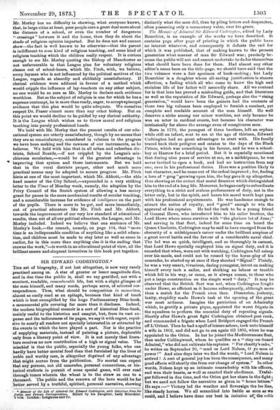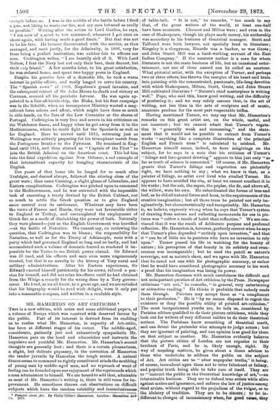SIR EDWARD CODRINGTON.*
TRE art of biography, if not lost altogether, is now very rarely practised among us. A star of greater or lesser magnitude dies, and in due time the public is, shall we say gratified, not with a succinct, readable, rememberable life, but with a slight glimpse of the man himself, and many roods, perhaps acres, of selected cor- respondence. Thus, what should be composition in memoriam, almost as easily read as an epitaph, becomes that kind of tomb which is best exemplified by the huge Parliamentary Blue-book, a monumental pile covering far more than it discloses. Indeed, the modern biographical memoir is a sort of historical Blue-book, mainly useful to the historian and essayist, but, from its vast ex- panse and the tediousness of its pages, we say it with regret, repul- sive to nearly all readers not specially interested in or attracted by the events in which the hero played a part. Nor is the practice of supplying materials, instead of painting a picture, deplorable only from a literary point of view. It is not merely that litera- ture receives no new contribution of a high or signal value. The mischief is that the public, especially the young folks, who can hardly have better mental food than that furnished by the lives of noble and worthy men, is altogether deprived of any advantage that might accrue from the publication. No mortal can expect that any persons, not old comrades, personal connections, or his- torical students in pursuit of some special game, will ever read through tomes wherein the wheat is to the straw as one to a thousand. The public and the renown of the hero would be far better served by a truthful, spirited, personal narrative, showing * Memoir of the Lift of Admiral Sir Edward Codrington, with sdeetions from his .Public and Private Corresposidence. Edited by his Daughter, Lady Bourchier. 2 vols. London: Longman and Co.
distinctly what the man did, than by piling letters and despatches, often possessing only a momentary value, over his grave.
The Memoir of Admiral Sir Edward Codrington, edited by Lady Bourchier, is an example of the works we have described. It contains page after page of printing in which the public have no interest whatever, and consequently it defeats the end for which it was published, that of making known to the present generation what manner of man Sir Edward was ; precisely be- cause the public will not and cannot undertake to do for themselves what should have been done for them. Had almost any other editor's name been on the title-page, we should have said that the two volumes were a fair specimen of book-making ; but Lady Bourchier is a daughter whose all-saving justification is sincere affection, a feeling which all who come to know the high and stainless life of her father will assuredly share. All we contend for is that love has proved a misleading guide, and that literature as well as the reputation of Sir Edward, perhaps also the "rising generation," would have been the gainers had the contents of these two big volumes been employed to furnish a succinct, yet complete and readable account of the man himself. He well deserves a niche among our minor worthies, not only because he was an actor in cardinal events, but because his character was intrinsically far above the average even of conspicuous men.
Born in 1770, the youngest of three brothers, left an orphan while still an infant, sent to sea at the age of thirteen, Edward Codrington had no great advantages to start with. His family traced back their pedigree and estates to the days of the Black Prince, which was something in his favour, and he was a school- boy at Harrow for a brief period. But it is especially mentioned that during nine years of service at sea, as a midshipman, he was never invited to open a book, and had no instruction from any one, save in his professional duties. Here was a position likely to test character, and he came out of the ordeal improved ; for, finding a love of " grog " growing upon him, the boy gave it up altogether, thus showing at the outset that moral firmness which distinguished him to the end of a long life. Moreover, hebegan early to subordinate everything to a strict and zealous performance of duty, not in the letter only, but in the spirit, and hence his moral worth kept pace with his professional acquirements. He was handsome enough to attract the notice of royalty, and " good" enough to win the approval of his captains. He had the luck to be a young friend of General Howe, who introduced him to his sailor brother, the Lord Howe whose name survives with " the glorious 1st of J une ;" and serving in that fleet, indeed for some time on board the Queen Charlotte, Codrington may be said to have emerged from the obscurity of a midshipman's career under the brilliant auspices of a great naval battle and the favour of a considerable naval chief. The lad was so quick, intelligent, and so thoroughly in earnest, that Lord Howe specially employed him on signal duty, and it is recorded that when, worn out with watching, Codrington fell asleep over his meals, and could not be roused by the horse-play of his comrades, he started up at once if they shouted "Signal!" Plainly, he was a very smart, vivacious, daring youngster, intent on making himself every inch a sailor, and shirking no labour or trouble which fell in his way, or came, as it always comes, to those who put a large construction on the simple word " duty." It may be observed that the British fleet was not, when Codrington fought under Howe, so efficient as it became subsequently, although more than a match for the French even then. Dissension, jealousy, laxity, stupidity made Howe's task at the opening of the great war most arduous. Imagine the patriotism of an Admiralty which, to gratify a private pique, appointed the worst frigate in the squadron to perform the essential duty of repeating signals. Shortly after Howe's great fight Codrington obtained poet rank, and commanded a frigate when Lord Bridport engaged the French off L'Orient. Then he had a spell of leisure ashore, took unto himself a wife in 1802, and did not go to sea again till 1805, when he was appointed to the Orion. In her he joined the Mediterranean fleet, then under Collingwood, whom he qualifies as a " stay-on-board Admiral," who did not cultivate his captains. " For charity's sake," he writes on September 20, " send us Lord Nelson, 0 ye men of power !" And nine days later we find the words, " Lord Nelson is arrived ! A sort of general joy has been the consequence, and many good effects will shortly rise from our change of system." In other words, Nelson kept up an intimate comradeship with his officers, and won their hearts, as well as exacted their obedience. Trafal- gar followed in due time, and the Orion got her share in the fight ; but we need not follow the narrative as given in " home letters." He says :—" Victory led the weather and Sovereign the lee line, like steady heroes. We all scrambled into battle as soon as we could, and I believe have done our best in imitation of the noble example before us. I was in the middle of the battle before I fired a gun, not liking to waste our fire, and my men behaved as coolly as possible." Writing after the action to Lord Garlies, he says, " I am now of a mind to rest contented, whenever I get once on shore again, with having made a good finale." But that was not to be his fate. He became discontented with the service, as then managed, and moat justly, for the Admiralty, in 1806, very far from being a perfect institution, was neither fair to officers nor men. Codrington writes, "I am heartily sick of it. With Lord Nelson, I fear the Navy lost not only their best, their dearest, but their only friend." A few months later, to his great satisfaction, he was ordered home, and spent two happy years in England.
Despite his genuine love of a domestic life, he took a warm interest in public affairs, and really longed to serve his country. The "Spanish news" of 1808, Napoleon's grand invasion, and the subsequent retreat of Sir John Moore to death and victory at Corunua, aroused all his patriotic fervour. He was again ap- pointed to a line-of-battle ship, the Blake, but his first campaign was in the Scheldt, when an incompetent Ministry wasted a mag- nificent force ashore and afloat, which might have done so much in able hands, on the flats of the Low Countries or the shores of Portugal. Codrington is very free and severe in his criticisms on the Walcheren fiasco, and happy when he got away from it to the Mediterranean, where he could fight for the Spaniards as well as for England. Here he served until 1813, returning just as Wellington was actively preparing for his triumphant march from the Portuguese frontier to the Pyrenees. He remained in Eng- land until 1814, and then started as "Captain of the Fleet" to join the British Admiral on the American coast. This led him into the fatal expedition against New Orleans, a sad example of that intermittent capacity for bungling characteristic of the English.
Ten years of that home life he longed for so much after Trafalgar, and desired always, followed the stirring close of the great wars ; then came Canning, a slight gleam of Liberalism, and Eastern complications. Codrington was pitched upon to command in the Mediterranean, and he was entrusted with the impossible task of executing a treaty devised by the British Cabinet, not so much to settle the Greek question as to give England some control over its settlement. Whatever may have been the views of France and Russia, they were not favourable either to England or Turkey, and contemplated the employment of Greek fire as a mode of diminishing the power of both. Naturally they were pleased—just as the English Government was horrified —at the battle of Navarino. We cannot say, on reviewing the question, that Codrington was to blame ; the responsibility for Navarino, as well as for the Treaty of Adrianople, rests with a party which had governed England so long and so badly, and had accumulated such a volume of domestic hatred as rendered it im- possible for the Tories to use British power abroad. Sir Edward was ill used, and his officers and men even more ungenerously treated, but that is no novelty in the history of Tory naval and military administrations. After his Eastern experiences, Sir Edward exerted himself persistently for his crews, refused a pen- sion for himself, and did not relax his efforts until he had obtained from the Whigs a remedy for the wrong done by a Tory govern- ment. He lived, as we all know, to a great age, and we are satisfied that his biography would be read with delight, were it only put into a reasonable compass, and written in a readable style.







































 Previous page
Previous page